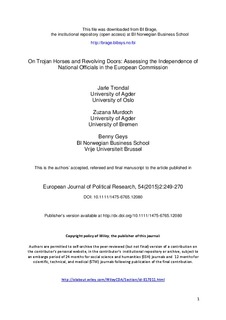| dc.contributor.author | Trondal, Jarle | |
| dc.contributor.author | Murdoch, Zuzana | |
| dc.contributor.author | Geys, Benny | |
| dc.date.accessioned | 2015-05-30T08:14:43Z | |
| dc.date.accessioned | 2015-07-27T11:29:28Z | |
| dc.date.available | 2015-05-30T08:14:43Z | |
| dc.date.available | 2015-07-27T11:29:28Z | |
| dc.date.issued | 2015 | |
| dc.identifier.citation | European Journal of Political Research 2015, 54(2):249-270 | nb_NO |
| dc.identifier.issn | 0304-4130 | |
| dc.identifier.issn | 1475-6765 | |
| dc.identifier.uri | http://hdl.handle.net/11250/293651 | |
| dc.description | This is the author's accepted and refereed manuscript to the article | nb_NO |
| dc.description.abstract | Abstract.
National officials working in international bureaucracies regularly invokes the fear that member-states strategically use such officials for influencing decision-making and agenda-setting to their advantage. This article first theoretically analyses conditions under which the independence of national civil servants in international bureaucracies might become compromised. The ensuing predictions are then tested using a unique survey among Seconded National Experts (SNEs) in the European Commission (N ≈ 400). Finally, evaluating the characteristics linked to reduced independence among SNEs in the Commission, the article illustrates that these officials are in practice likely to be relatively independent from member-state influence. | nb_NO |
| dc.language.iso | eng | nb_NO |
| dc.publisher | Wiley | nb_NO |
| dc.title | On Trojan Horses and revolving doors: Assessing the autonomy of national officials in the European Commission | nb_NO |
| dc.type | Journal article | nb_NO |
| dc.type | Peer reviewed | nb_NO |
| dc.date.updated | 2015-05-30T08:14:43Z | |
| dc.source.journal | European Journal of Political Research | nb_NO |
| dc.identifier.doi | 10.1111/1475-6765.12080 | |
| dc.identifier.cristin | 1243132 | |
| dc.description.localcode | 2, Forfatterversjon | nb_NO |
